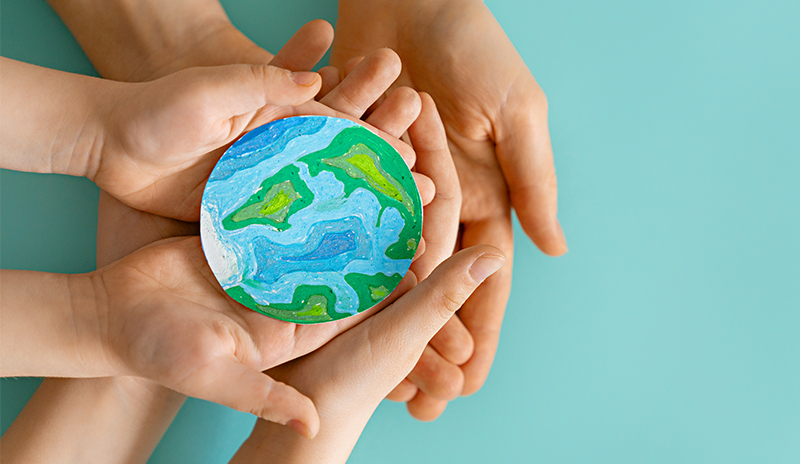Raising a Generation of Earth Keepers
Every year Earth Day is celebrated on 22nd April to create awareness about the rising levels of pollution and to devise strategies to keep our blue planet safe. The need to protect and safeguard our planet is crucial now than ever before. But while there is a buzz created during Earth Day celebrations in schools, colleges, and corporates, it doesn’t culminate into continuous practice and an ongoing agenda for us Earthlings.
Therefore, schools are now including Environmental Studies as a separate subject for classes IX to XII and for grades I to VIII it is a part of the social science syllabus across progressive cities like Dubai and other regions in the Middle East. The aim is to raise a generation of responsible Earth Keepers, who practice vigilance in their everyday lives and adopt Environmentally Friendly alternatives which are not only sustainable but also contribute to making our Earth greener.

Projects & Activities that Promote Green Thinking
Grow Your Own Food:
Allocating a patch of land to cultivate a school garden to grow seasonal veggies, fruits, & flowers, seems like a fun thing to do. It’s a very hands-on approach and children have to take efforts to ensure proper maintenance of the plants sown by them in the garden. By getting their hands dirty, students learn to take care of plants and start appreciating the food that is on their plates. They also learn why the wastage of food is discouraged. Moreover, organically grown food is much healthier and free from harmful pesticides. Taking back home freshly ripen ‘veggie’ serves as a validation for children and they become torchbearers of change by spreading the message of ‘growing your own garden’.
Get Creative with Recycling:
What could you possibly do with all the newspaper heap that gets collected in hour homes at the end of the month? Throw it in the garbage? Nah…instead let’s get creative. Use newspaper for wrapping birthday gifts rather than buying extra glitter paper from a shop. Students can cover their school textbooks with newspaper wrapping, giving it a kind of vintage feel. Alternatively, ‘used plastic bottles’ can be recrafted to become plant holders and can double as a flower pot. The possibilities are endless here; just ask students to use their imagination and be as creative as possible.
Responsible Trash Disposers:
Schools can host ongoing campaigns through the year by dividing children into groups – ‘green segregators’, ‘blue recyclers’, and ‘black champions’ – each representing the respective recyclable color dustbin found in our neighborhoods. The responsibility of each team is not only to dispose of waste correctly; green bin – for biodegradable waste such as vegetable skins, blue bin – for dry waste such as plastics, and black bin – for electronic waste & hazardous medical waste, but to propagate the same in their respective residential societies and neighborhood areas.

Replacing Plastic Items:
It’s no secret that plastic is an absolute threat to the environment and every measure must be made to curb the usage of plastics. However, due to its cheap pricing and durable nature, plastic items are unavoidable and are rampantly available in the market due to their high demand. Now the onus lies on us, the citizens of the world to stop the usage of plastic by replacing it with items of other eco-friendly materials. Every classroom should have a practice of encouraging students to shop for household items or toys that are non-plastic in nature and even go to the extent of having competitions where children get a platform to invent things made of ‘biodegradable’ materials, to replace the nuisance of plastics. Like, using wooden toothbrushes and bamboo straws, or even earbuds made of paper sticks, are some good ideas to start with.
Go Paperless – Create Digital Awareness
Children can use their graphic design skills to design attractive e-postcards, e-posters, and e-pamphlets and run social media campaigns online. Teachers can opt for the TechnoKids comprehensive module on TechnoEnvironment that has ready-made step-by-step lesson plans and resources to enable students to get started. The in-built templates, paired with good knowledge of graphic design & publishing skills using Microsoft Publisher, will empower children to conceptualize and execute impact-worthy campaigns that appeal to audiences and evoke Environmental Consciousness amongst peers & other audiences. To avail of the TechnoKids digital resource curriculum in UAE or GCC regions, visit our website.






Recent Comments